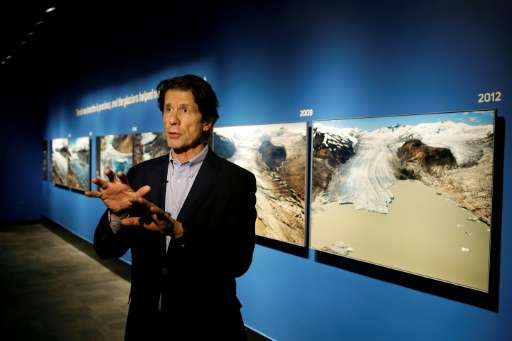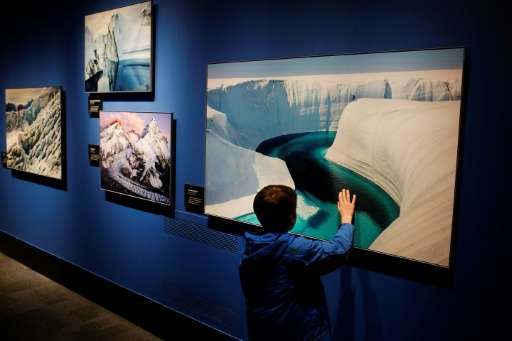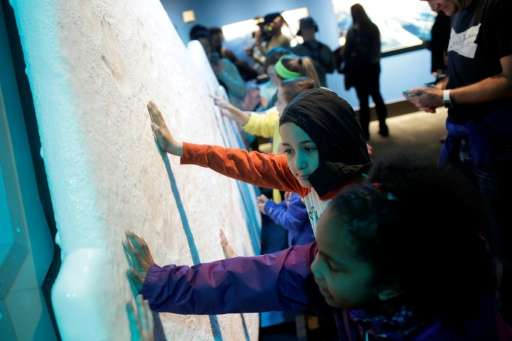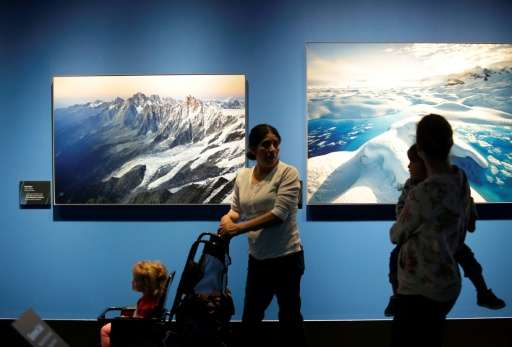Photographer captures world's glacier melt over decade

For the last decade, American photographer James Balog has been on a mission to document climate change through his camera lens.
His effort has taken him to the farthest reaches of the world, from Antarctica to the northern ends of Greenland, where he has captured the movements and melts of immense glaciers.
The results of his work were on display at Chicago's Museum of Science and Industry, which on Thursday opened the exhibit "Extreme Ice."
"I want people to understand the ice," Balog told AFP in an interview at the show opening. "Ice is the manifestation of climate change in action."
That change, often imperceptibly slow, is invisible to the eye. But, through time lapse photography, Balog reveals how 24 glaciers around the world are evolving—showing giant bodies of ice moving in currents, and crystal blue or green water pooling as melting accelerates.
A scientist by training, Balog's work has already garnered attention and been the subject of two documentaries.
This latest exhibit in Chicago, which juxtaposes photographs of glaciers taken years apart to show their rapid decline, offers updated images and new locations, such as Mount Kilimanjaro in Tanzania.

"(The images) make this subject alive and resonant in people's hearts and minds, in a way that just pure art or pure science wouldn't do alone," Balog said.
'Climate change is happening'
More than 90 percent of the world's glaciers are melting, with 75 billion tons of ice lost in Alaska alone every year. The scale of the problem can be hard to comprehend, but Balog's photographs make it more understandable.
Two juxtaposed images of the Bridge Glacier in Canada—a thick sheet of ice covering a vast valley—show its substantial retreat over a period of just three years.
A section of the Trift Glacier in Switzerland, the height of a mid-rise building with beautiful white, blue and brown hues, appears shriveled to almost nothing over a nine-year period.
"People (who) don't believe in global warming and climate change, they need to see this exhibit. Because it's real," said Sharonya Simon, who appeared stunned while viewing the photographs.

Simon, a teacher, brought her elementary school class to the museum on a field trip. The children were enthralled by the photos and the giant wall of man-made ice which they could touch.
"These photographs, these films, these interactives, these are bringing people closer to the science," said Patricia Ward, director of science and technology at the museum.
"It's about making people more aware. People understand that climate change is happening, but it may not always be front and center in their mind," she said.
'Suddenly you're stunned'
Balog's images surprised even him back in 2007, when he first started placing specially outfitted time-lapse cameras in remote parts of the world.
"When you stand out there, you don't see any of these changes," Balog said. "When you string together a whole set of those images, suddenly you're stunned."

In the works for more than two years, the exhibit comes as President Donald Trump's administration moves to roll back US regulations aimed at curbing climate change.
Trump has threatened to pull the US out of the Paris accord on global warming, and proposed funding cuts to climate change research at home. The White House's budget director Mick Mulvaney has called such funding "a waste of money."
Through the exhibit, Balog and the museum in the United States' de facto Midwest capital, are putting a stake in the ground on the side of climate science.
"I see this as being a broad, broad issue that applies to everyone regardless of their partisan political interest. So, I find this intense politicization of the issue right now, in the current administration, to be a real problem," Balog said.
He is now embarking on his second decade of gathering images of the world's glaciers.
© 2017 AFP



















